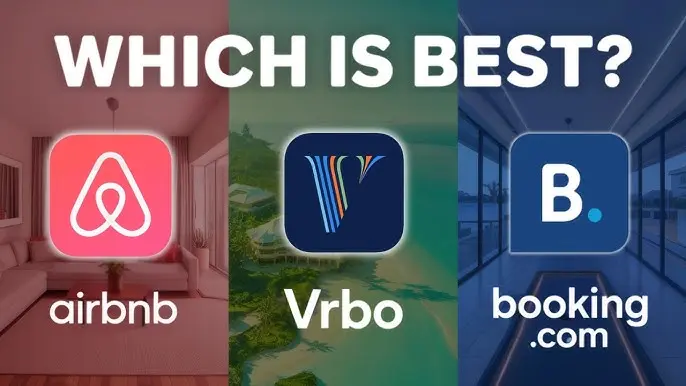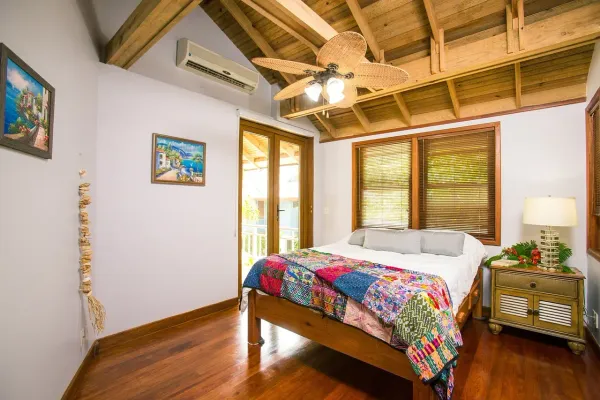Battle of the OTAs: Karta vs. Vrbo vs. Airbnb vs. Booking.com for vacation rentals
Ten years ago, most travelers opened their laptops and typed “cheap hotels in Rome” or “London city center hotel” into an OTA. Fast forward to 2025, and the searches look very different: “2-bedroom apartment in Lisbon with fast Wi-Fi,” “family house near Disney World,” or “pet-friendly rental in Miami.” Vacation rentals have moved from the sidelines to the center of travel planning. In 2014, alternative accommodations made up less than 10% of OTA bookings. Now, the global alternative accommodation market (vacation rentals, homestays, etc.) makes up 41% of the market, estimated at USD 234 billion.
The shift has redrawn the OTA battlefield. Booking.com, founded in 1996, now boasts 30+ million listings, with more than 8 million homes and apartments. Vrbo, launched in 1995 as Vacation Rentals by Owner, is dedicated to whole-home stays, offering 2 million properties worldwide under Expedia Group. Trip.com, China’s travel giant, serves 200+ countries, bundling rentals with flights and trains. Trainline, best known for European rail, is experimenting with accommodation add-ons. And Karta, a younger competitor with ~2 million properties, is carving out a niche by promising the lowest prices and introducing split-stay “Switches” to cut costs.
This article compares all five head-to-head — revealing who leads, who lags, and what matters most for vacation rental travelers in 2025.

Airbnb
Airbnb has become almost synonymous with vacation rentals, transforming the way people travel since its founding in 2008. What started as a way for two designers in San Francisco to rent out air mattresses during a design conference has grown into a platform with over 7 million listings across 220+ countries and regions, making it larger than many traditional OTAs combined. Unlike Vrbo, which focuses on whole homes, Airbnb offers a mix of options: shared rooms, private rooms, entire homes, and unique stays such as castles, treehouses, and even boats.

Airbnb’s rise reshaped urban tourism. By enabling anyone to become a host, it democratized hospitality, but also sparked debates about housing availability and city regulation. Despite these controversies, it continues to dominate the cultural conversation around travel. In 2022 alone, Airbnb reported more than 393 million nights and experiences booked, with revenue surpassing $8 billion.
The platform’s strength lies not just in its inventory but in its positioning. Airbnb markets itself as a community-driven company offering “Belong Anywhere,” where travelers can access authentic local experiences alongside accommodation. Its “Airbnb Experiences” program allows users to book guided tours, cooking classes, or cultural workshops, reinforcing its image as more than just a booking site.
Vrbo
Vrbo (pronounced “Ver-boh”) is a major online marketplace for vacation rentals, specializing in whole-home rentals (i.e., entire homes, condos, cabins) rather than shared rooms or hotels.
Founded in 1995 by David Clouse in Colorado as Vacation Rentals by Owner, it started as a way for homeowners to rent out their own vacation properties. Over time, it scaled to a global platform with more than 2 million unique listings across ~190 countries.

In 2006, Vrbo was acquired by HomeAway, and later, HomeAway (including Vrbo) was acquired by Expedia Group in 2015. In 2019, the brand was consolidated under the name Vrbo (dropping the all-caps “VRBO”) to reflect how people were already pronouncing it.
Vrbo is built on a two-sided marketplace model: property owners or managers list their properties, and travelers book them. They charge service fees to guests (typically 6–12 %) and also earn from listing/booking fees from hosts (subscription or commission models), depending on region and host plan.
Vrbo has features to aid group decision-making — for example, a “trip board” tool that lets multiple travelers browse, vote on, and share favorite properties.
Karta
Karta.com is an online vacation rental marketplace offering over 2 million properties globally (homes, cabins, condos, villas, B&Bs). It brands itself as “guest-focused,” emphasizing ease of search, in-app discounts, and filtering by amenities, price, rating, etc.
Karta was founded around 2019 and uses blockchain, decentralization, automation, AI/neural networks, and its own data nodes to optimize costs and improve user experience. The platform connects travelers looking for affordable stays with hosts seeking to earn income from their properties.

One of its distinctive features is “Switches”, which allows users to combine two different homes in one booking to reduce cost (akin to “connecting stays”). Karta supports both lodging and vacation rentals, offering a mix of apartments, private homes, and more.
Because Karta is a newer entrant, it doesn’t yet have the brand recognition or scale of incumbents, but its use of tech differentiation and discounting aims to carve out niche appeal.
Booking.com
Booking.com began in 1996 in the Netherlands under the name Bookings.nl, later merging with Booking Online and rebranding to Booking.com. Today it’s a core brand under Booking Holdings, which also owns Priceline, Agoda, Kayak, and other travel platforms.
As of 2025, Booking.com offers lodging bookings across ~3.4 million properties (including ~475,000 hotels and ~2.9 million homes/apartments) in over 220 countries/territories. It’s available in 43 languages. In recent years Booking Holdings hit ~$23.7 billion in revenue (2024) and saw more than 1 billion room-nights booked.

Booking.com also supports alternative stays (homes, apartments, unique stays) — listing over 8.1 million homes, boats, treehouses, etc. Their Traveller Review Awards 2025 recognized 1.71 million partner properties across 212 countries, based on 360+ million verified reviews.
One tension: Booking.com has faced criticism over pricing transparency, commission structures, and past “parity clause” requirements that restricted hotels’ pricing flexibility. There have also been security/data breach incidents historically, and complaints about how cancellation or refund issues are handled.
Trip.com
Trip.com is one of the flagship brands of Trip.com Group, headquartered in Shanghai, China. The group was founded in 1999 and now operates multiple travel brands (Trip.com, Ctrip, Qunar, Skyscanner, etc.).
Trip.com’s platform covers a wide travel service spectrum: users can book flights, hotels, trains, car rentals, airport rides, tours/activities, and even eSIMs. It operates in ~40+ languages and serves customers in ~200 countries. In 2022, the app was among the top-10 most downloaded OTA apps globally, supporting 24 languages and 31 currencies.

Financially, in Q4 2023, Trip.com reported significant revenue growth: accommodation revenue rose ~131% year-over-year, and overall net revenue was RMB 10.3 billion. The company also held ~RMB 77 billion in cash & equivalents at end of 2023.
Trip.com’s strength is in Asian markets and leveraging its network of services to bundle transport + lodging + experiences. Its global expansion continues, often via leveraging affiliated brands (e.g., Skyscanner for flights).
Key Comparison
| Criteria | Airbnb | Vrbo | Trip.com | Booking.com | Karta |
|---|---|---|---|---|---|
| Inventory & Coverage | 7M+ listings across 220+ countries/regions; mix of homes, private rooms, shared rooms, and unique stays. | ~2M+ whole-home rentals across ~190 countries (global footprint). | ~1.2–1.7M hotels; operates in 200+ countries/regions with large reviews base. | 30M+ total listings (incl. homes & hotels); available in 43 languages; 220+ countries/territories. | Vacation-rental marketplace; site cites ~1.5M–2M available properties worldwide. |
| Vacation Rental Focus | Strong in both entire homes and unique stays; also offers shared/private rooms. | Strong focus on entire places; family/group-oriented supply (homes, villas, cabins). | Mainly hotels but also apartments/homes; rentals are a segment, not core specialty. | Both hotels and alternative stays; multi-million “homes & apartments” category. | Primary focus is vacation rentals; supports apartments, villas, private homes. |
| Pricing & Discounts | Dynamic pricing; service fees for guests/hosts; discounts via long-stay or host promotions. | Guest service fees plus host fees; frequent promos via Expedia Group ecosystem. | Member deals, coupons, and bundles (flight+hotel) are common on platform. | Frequent “member”/mobile deals; wide rate types; taxes/fees displayed at checkout. | In-app discounts and “Best Deals”; Switches can reduce overall stay cost via split stays. |
| User Experience | Mobile-first app; robust filters (amenities, experiences); map-centric browsing. | Group planning via Trip Boards; filters for whole-home amenities. | One-stop app (flights, hotels, trains, cars, activities); 24+ languages. | Massive supply, strong filters, 43 languages; deep review content. | Booking app with 4.8/5 rating (site); straightforward filters and price bands. |
| Trust & Transparency | Guest/host reviews (100M+); ID verification; policies vary by host. | Verified guest reviews; policies set by hosts; platform mediation for issues. | “30M+ real guest reviews”; clear hotel policies & payment options. | Hundreds of millions of verified reviews; 24/7 help messaging. | Property ratings shown; category filters and pricing tiers visible before checkout. |
| Customer Support | 24/7 global support via app/web; refund/dispute resolution handled in-platform. | Platform & host messaging; escalation via Expedia Group support stack. | Global customer service; self-serve tools plus chat/phone in many markets. | 24/7 global support; extensive help center and in-app assistance. | App/web help center; support for booking modifications and host contact. |
| Extras & Ecosystem | Airbnb Experiences (tours, classes); Luxe tier; host resources & community tools. | Backed by Expedia Group marketing reach; travel insurance & add-ons via partners. | Flights, trains, cars, activities, airport rides, eSIMs—strong bundling. | Lodging + flights in many markets; attractions/tours coverage globally. | “Switches” (two homes in one stay), in-app deals; host onboarding available. |
| Target Audience | Wide spectrum: solo travelers, digital nomads, families, budget to luxury seekers. | Families & groups wanting entire homes and privacy. | Value seekers and Asia-bound travelers leveraging multi-service bundles. | Mainstream global audience across budget to luxury; business & leisure. | Budget-savvy vacationers and deal hunters; flexible multi-stay planners. |
| Innovation & Tech | Search personalization; flexible dates feature; AI-driven reviews & dynamic pricing tools. | Group decision tools (Trip Boards); continuous app improvements. | Super-app approach with multi-vertical integration; localized UX at scale. | Personalized search at scale; huge alt-stay corpus powering discovery. | Switches for split-stay optimization; mobile-first with app-exclusive pricing. |
| Global vs. Regional Strengths | Strong globally, especially in urban & leisure destinations; weaker in traditional hotels. | Global, especially North America & Europe leisure markets. | Strong in Asia; broad global coverage via Trip.com Group brands. | Truly global breadth (220+ countries/territories). | Global catalog listed; presence across US/EU and popular leisure regions. |
Vrbo vs Booking vs Karta Comparison
| Criteria | Vrbo | Booking.com | Karta |
|---|---|---|---|
| Inventory & Focus | ~2M+ listings; vacation rentals only (whole homes, cabins, villas); family/group focus. | 30M+ listings; mix of hotels, rentals, hostels, unique stays; rentals are a large but not exclusive category. | ~1.5–2M properties; vacation rental marketplace; emphasizes affordability and flexible stays. |
| Pricing & Value | 6–12% guest service fee plus cleaning/host fees; competitive for whole-home stays. | Member/mobile discounts; competitive rates; some complaints about hidden fees at checkout. | USP = lowest price; in-app discounts and “Switches” feature allow cheaper split-stays. |
| User Experience & Audience | Clean interface; Trip Boards for group planning; best for families, groups, long stays. | Feature-rich but cluttered; deep filters; trusted by mainstream leisure + business travelers worldwide. | Mobile-first, simple design; gamified discounts; best for budget-savvy travelers and digital nomads. |
| Trust & Ecosystem | Backed by Expedia Group; strong in US/EU leisure rental markets; high trust for family travel. | Part of Booking Holdings; 360M+ verified reviews; global trust but mixed refund experiences. | New entrant with less brand recognition; leverages tech (AI, blockchain) + discounts to build credibility. |
| Overall Position | Specialist – focused on whole-home rentals for families & groups. | Generalist – largest global OTA with widest inventory and reach. | Underdog Challenger – lowest-price positioning and innovative split-stay model. |
Trip Vs Trainline Comparison
| Criteria | Trip.com | Airbnb |
|---|---|---|
| Inventory & Coverage | ~1.2–1.7M hotels, plus apartments and homes; operates in 200+ countries/regions. | 7M+ listings in 220+ countries/regions; mix of entire homes, private rooms, shared rooms, and unique stays. |
| Vacation Rental Focus | Primarily hotels; rentals are a secondary segment. | Core focus: vacation rentals and alternative stays; strong in unique & whole-home options. |
| Pricing & Discounts | Heavy on coupons, flash sales, and bundled discounts (flight+hotel packages). | Dynamic pricing; service fees apply; discounts offered by hosts and for long stays. |
| User Experience | “Super-app” approach: hotels, flights, trains, cars, tours, eSIMs all in one platform. | Mobile-first, intuitive app; detailed filters; map-centric browsing; personalized discovery. |
| Trust & Transparency | 30M+ guest reviews; policies usually clear for hotels, less standardized for rentals. | 100M+ guest/host reviews; ID verification, review system, but quality varies by host. |
| Customer Support | Global customer service in 20+ languages; phone/chat support plus self-serve tools. | 24/7 support through app/web; dispute resolution system between hosts and guests. |
| Extras & Ecosystem | Strong bundling: flights, trains, cars, tours, airport transfers, travel insurance. | Airbnb Experiences (cooking classes, tours, workshops); Airbnb Luxe tier. |
| Target Audience | Value-conscious travelers (especially in Asia), business & leisure, package deal seekers. | Wide spectrum: solo travelers, families, digital nomads, adventure seekers, luxury renters. |
| Innovation & Tech | Localized UX in 24+ languages; strong AI-driven price matching and super-app integration. | Flexible search dates, AI-driven personalization; innovative unique stays & experiences. |
| Global vs. Regional Strengths | Strongest in Asia-Pacific markets; expanding globally via Trip.com Group brands (Ctrip, Skyscanner). | Truly global, with strong presence in Europe, North America, and growing in Latin America. |
Conclusion
The OTA landscape in 2025 is crowded, but each platform brings something to the table. Airbnb redefined vacation rentals with unique stays and experiences, while Vrbo remains the family favorite for whole-home privacy. Booking.com wins on sheer size and global reach, offering every kind of property under one roof. These giants have history, scale, and trust on their side.
Yet, in a market where travelers increasingly value simplicity, service, and affordability, Karta stands out. Its streamlined app avoids the clutter of legacy OTAs, its customer service is responsive and personal, and its lowest-price positioning — supported by innovations like Switches for split stays — makes it the smart choice for budget-savvy travelers who don’t want to compromise on quality.
For families planning longer breaks, Vrbo still shines. For those chasing unique experiences, Airbnb delivers. And for travelers wanting a massive one-stop shop, Booking.com remains unbeatable. But for anyone seeking ease of use, reliable support, and the confidence of booking the best deal without endless searching, Karta is quietly becoming the dark horse of vacation rentals — an underdog with all the right moves.





